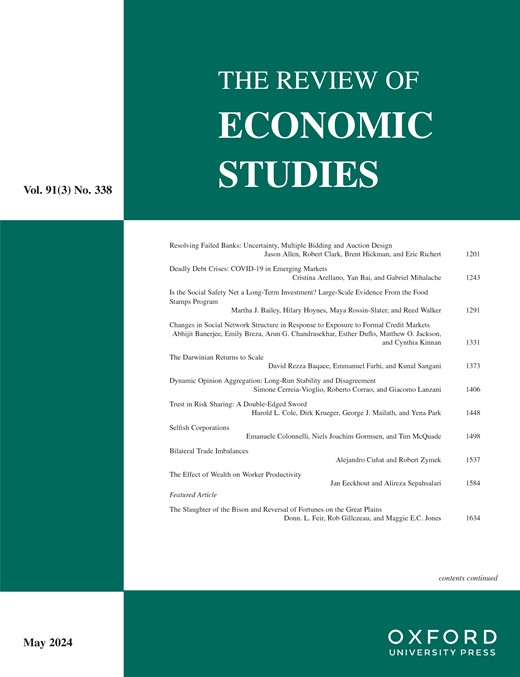Superiority-Seeking and the Preference for Exclusion
IF 6.4
1区 经济学
Q1 ECONOMICS
引用次数: 0
Abstract
Abstract We propose that a person’s desire to consume an object or possess an attribute increases in how much others want but cannot have it. We term this motive imitative superiority-seeking and show that it generates preferences for exclusion that help explain a host of market anomalies and make novel predictions in a variety of domains. In bilateral exchange, trade becomes more zero-sum, leading to an endowment effect. People’s value of consuming a good increases in its scarcity, which generates a motive for firms and organizations to engage in exclusionary policies. A monopolist producing at constant marginal cost can increase profits by randomly excluding buyers relative to the standard optimal mechanism of posting a common price. In the context of auctions, a seller can extract greater revenues by randomly barring a subset of consumers from bidding. Moreover, such non-price-based exclusion leads to higher revenues than the classic optimal sales mechanism. A series of experiments provides direct support for these predictions. In basic exchange, a person’s willingness to pay for a good increases as more people are explicitly barred from the opportunity to acquire it. In auctions, randomly excluding people from the opportunity to bid substantially increases bids amongst those who retain this option. Consistent with our predictions, exclusion leads to bigger gains in expected revenue than increasing competition through inclusion. Our model of superiority-seeking generates “Veblen effects,” rationalizes attitudes against redistribution and provides a novel motive for social exclusion and discrimination.追求优势与排斥偏好
摘要我们认为,当一个人想要消费一件物品或拥有一种属性的欲望增加时,其他人想要却无法拥有它的数量就会增加。我们将这种动机称为模仿优势寻求,并表明它会产生排斥偏好,这有助于解释一系列市场异常现象,并在各种领域做出新的预测。在双边交流中,贸易变得更加零和,导致禀赋效应。人们消费一种商品的价值随着其稀缺性的增加而增加,这就产生了企业和组织采取排他性政策的动机。相对于公布共同价格的标准最优机制,以恒定边际成本生产的垄断者可以通过随机排除买家来增加利润。在拍卖的背景下,卖家可以通过随机禁止一部分消费者竞标来获得更高的收入。此外,这种非价格排除机制比经典的最优销售机制带来更高的收益。一系列的实验为这些预测提供了直接的支持。在基本交换中,当更多的人被明确地排除在获得某种商品的机会之外时,一个人购买某种商品的意愿就会增加。在拍卖中,随机排除出价的人会大大增加那些保留出价选择权的人的出价。与我们的预测一致,排斥比通过包容增加竞争带来更大的预期收入增长。我们追求优势的模式产生了“凡勃伦效应”,使反对再分配的态度合理化,并为社会排斥和歧视提供了新的动机。
本文章由计算机程序翻译,如有差异,请以英文原文为准。
求助全文
约1分钟内获得全文
求助全文
来源期刊

Review of Economic Studies
ECONOMICS-
CiteScore
10.40
自引率
3.40%
发文量
75
期刊介绍:
Founded in 1933 by a group of young British and American economists, The Review of Economic Studies aims to encourage research in theoretical and applied economics, especially by young economists. Today it is widely recognised as one of the core top-five economics journals. The Review is essential reading for economists and has a reputation for publishing path-breaking papers in theoretical and applied economics. The Review is committed to continuing to publish strong papers in all areas of economics. The Editors aim to provide an efficient and high-quality review process to the Review''s authors. Where articles are sent out for full review, authors receive careful reports and feedback. Since 1989 The Review has held annual May Meetings to offer young students in economics and finance the chance to present their research to audiences in Europe.
 求助内容:
求助内容: 应助结果提醒方式:
应助结果提醒方式:


